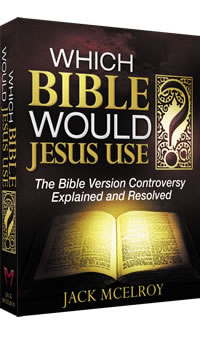Is Jesus "God's Son" or "God's Servant?"
Do you see a difference between these two Bible versions?
King James Version
Acts 3:25 Ye are the children of the prophets, and of the covenant which God made with our fathers, saying unto Abraham, And in thy seed shall all the kindreds of the earth be blessed.Acts 3:26 Unto you first God, having raised up his Son Jesus, sent him to bless you, in turning away every one of you from his iniquities.
New King James Version
Acts 3:25 You are the sons of the prophets, and of the covenent which God made with our fathers, saying to Abraham, 'And in your seed all the families of the earth shall be blessed.Acts 3:26 To you first, God, having raised up His Servant Jesus, sent Him to bless you, in turning every one of you away from his iniquities.
In the KJV, we find that Jesus is God's Son. In the NKJV, we find that He is God's servant. These are clearly not the same! The Greek word found in the text here is "pais". It can be used in Greek for either "son" or "servant." So which one is correct here?
The solution is simple: look at the context in which it is used. In English, we have many words that can have more than one meaning. If a translator, going from English to another language, came across the word "bear," he would have a choice of meanings. But it wouldn't take rocket science to figure out which one to use.
If the passage described a man with a heavy burden, the translator would understand that the man is going to "bear," or "carry" the burden. If, on the other hand, the passage described a hairy beast climbing a tree, the translator would understand the correct meaning here applies to a forest-dwelling animal that will eat nearly anything it finds. It's not really very hard.
Now look at the Bible passage above. What is being discussed?
- "children of the prophets"
- "covenant which God made with our fathers"
- "in thy seed shall all the kindreds of the earth be blessed."
It's clear, isn't it? The passage is talking about "children," and "fathers" and "seed." The word "pais" means "son." But the New King James translators chose "servant." Why? They were not alone. The New World Translation, created by the Jehovah's Witnesses who deny the deity of Jesus, translated this word "servant" also. So do the NIV, ASV, NASB and other modern Bible translations.
Could it be that these modern translators disagree that "pais" can be translated "son?" No, the NKJV committee translates this very word as "boy," "child" or "son" in Matthew 2:16; 17:18; 21:15; Luke 2:43; 9:42; and John 4:51. Yet they refused to translate the word as "son" in this powerful sermon where Peter presents Jesus as Messiah and Son of God.
One has to ask, why were these translators so determined to deny the deity of Jesus in this passage? Is this a Bible you can trust with your eternal destiny?
- See more articles on related topics:
- Bible Versions
- King James Bible
- New King James Version (NKJV)
- Changes in Bible Versions
Other Articles from July/August 1999:
More on Bible Versions:
Products of Interest:
-

New King James - The Bridge Bible
It is NOT a King James Bible! It promised to be a 5th edition of the KJV, preserving "the originally intended meaning of every verse." But that's not what happened.
-

Look What's Missing!
256 pages
For years, publishers have been removing words, and even whole verses, from modern Bibles. What's missing from your Bible? Take a look! -

51 Reasons Why The King James
224 pages
Here are 51 reasons to trust that God kept His promise to preserve His own words. -

Answers to Your Bible Version Questions
224 pages
David W. Daniels answers difficult questions about the KJV. Learn how to defend the KJV and why you can trust it. -

Which Bible Would Jesus Use?
342 pages
Everyone's got an opinion as to which Bible is best. If Jesus walked into your church, which Bible would He quote from?



